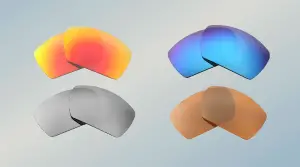Want to know what is the best lens color for trout fishing, in the article below I will discuss the pros and cons of the most commonly used lens colors.
If you are in a rush, and just want to know the best lens base color for sight fishing.
- Best general purpose (shallows): Amber, Copper, Brown, or Green
- Best low light: Yellow
- Best bright weather: Gray or Blue
- Best for deepwater: Blue
Amber, Copper, and Brown Lens Sunglasses Are Excellent for Sight Fishing
I decided to include both Amber and Copper Lenses, together. These two shades have more in common than separates them. Amber or Copper lenses are probably the most common dedicated lens color used for freshwater fishing.
If you just want one lens color for all of your trout fishing I suggest going for such a lens color.
Amber is best in moderate to high light conditions, but are still offers enough contrast to be useful in lower light conditions and enough protection on even bright sunny days.
- Makes red and greens seem more vibrant.
- Improves contrast against blue or green backdrops
- Improves contrast by reducing blue light
Yellow Lens Glasses are Excellent for Low Light Conditions
Yellow Lens glasses are generally best in low light conditions where they assist in increasing the contrast and simply make everything seem brighter.
Some situations where yellow lenses are best
- Early morning and late evening when the sun is low.
- When fishing under heavy canopy such as an overgrown creek where the sun struggles to penetrate.
- Stormy, overcast days with heavy cloud cover.
- Gloomy winter days when the sun is low in the sky.
Are Gray Lens Sunglasses Good for Trout Fishing?
Grey is a very common lens color for sunglasses, this darker shade provides a lot of relief in high light, very sunny conditions but it does not increase contrast. So does not assist in identifying trout.
- Bright sunny days
- When fishing from a boat
- Greatly reduce eye fatigue and strain in bright conditions
- Fairly neutral color so offers color perception.
Are Green Lens Glasses Suitable for Trout Fishing?
I must admit, I do not often see green lens glasses used for sight fishing. In some ways, green lenses behave quite similar to gray lenses but without darkening shadows.
- Fairly neutral color perceptions
- Good general purpose color
- Reduces glare, and brightens shadows.
When to wear Blue lens glasses
Blue lenses are another popular option for bright and sunny conditions, especially when looking down into the water where it is too deep to see the bottom. Blue greatly reduces blue light, which can assist in identifying fish in the mid-water column.
The reduction in color transmission can make sight fishing for trout more difficult due to the lack of contrast against a dark bottom.
- Very bright conditions
- Blue is a more popular choice for offshore fishing.
- Deepwater situations where you can not see the bottom.
When to Wear Rose Lenses?
This is another color I do not have a lot of experience with.
- Rose lenses are a popular niche in extremely bright and highly contrasting conditions such as fishing over white coral sand flats in the tropics.
- Rose is a less popular color for trout fishing because the low contrast against dark bottoms can make spotting dark trout difficult.
Are Mirrored Lens Glasses Good for Sight Fishing?
Mirror lenses when it comes to fishing are more fashion over function.
The main advantage is that in bright conditions they reflect some of the light away. If you want to wear a yellow or amber tinted lens in bright conditions, then a mirrored finish does help to reduce light levels.
Of course, the opposite applies under low light conditions. They reduce the amount of light reaching the eye making things more difficult to see.
Last Words
Most trout fishermen will be well served by Amber, Copper or Brown lenses.
For more information and advice on selecting the best sunglasses for trout fishing, I have a comprehensive article here.

